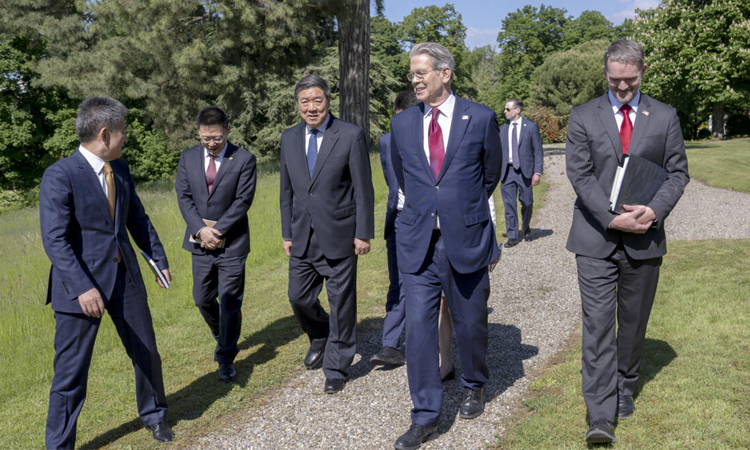News Flash

STOCKHOLM, July 28, 2025 (BSS/AFP) - Top economic officials from the United States and China are set to renew negotiations Monday -- with an extension of lower tariff levels on the cards -- as President Donald Trump's trade policy enters a critical week.
Talks between the world's top two economies are slated to happen over two days in the Swedish capital Stockholm, and they come as other countries are also rushing to finalise deals with Washington.
For dozens of trading partners, failing to strike an agreement in the coming days means they could face significant tariff hikes on exports to the United States come Friday, August 1.
The steeper rates, threatened against partners like Brazil and India, would raise the duties their products face from a "baseline" of 10 percent now to levels up to 50 percent.
Tariffs imposed by the Trump administration have already effectively raised duties on US imports to levels not seen since the 1930s, according to data from The Budget Lab research centre at Yale University.
For now, all eyes are on discussions between Washington and Beijing as a delegation including US Treasury Secretary Scott Bessent meets a Chinese team led by Vice Premier He Lifeng in Sweden.
While both countries in April imposed tariffs on each other's products that reached triple-digit levels, US duties this year have temporarily been lowered to 30 percent and China's countermeasures slashed to 10 percent.
But the 90-day truce, instituted after talks in Geneva in May, is set to expire on August 12.
Since the Geneva meeting, the two sides have convened in London to iron out disagreements.
- China progress? -
"There seems to have been a fairly significant shift in (US) administration thinking on China since particularly the London talks," said Emily Benson, head of strategy at Minerva Technology Futures.
"The mood now is much more focused on what's possible to achieve, on warming relations where possible and restraining any factors that could increase tensions," she told AFP.
Talks with China have not produced a deal but Benson said both countries have made progress, with certain rare earth and semiconductor flows restarting.
"Secretary Bessent has also signalled that he thinks a concrete outcome will be to delay the 90-day tariff pause," she said. "That's also promising, because it indicates that something potentially more substantive is on the horizon."
The South China Morning Post, citing sources on both sides, reported Sunday that Washington and Beijing are expected to extend their tariff pause by another 90 days.
Trump has announced pacts so far with the European Union, Britain, Vietnam, Japan, Indonesia and the Philippines, although details have been sparse.
An extension of the US-China deal to keep tariffs at reduced levels "would show that both sides see value in continuing talks", said Thibault Denamiel, a fellow at the Centre for Strategic and International Studies.
US-China Business Council President Sean Stein said the market is not anticipating a detailed readout from Stockholm: "What's more important is the atmosphere coming out."
"The business community is optimistic that the two presidents will meet later this year, hopefully in Beijing," he told AFP. "It's clear that on both sides, the final decision-maker is going to be the president."
Sweden's Prime Minister Ulf Kristersson said both countries' willingness to meet was a "positive development".
- Far from ideal -
For others, the prospect of higher US tariffs and few details from fresh trade deals mark "a far cry from the ideal scenario", said Denamiel.
But they show some progress, particularly with partners Washington has signalled are on its priority list like the EU, Japan, the Philippines and South Korea.
The EU unveiled a pact with Washington on Sunday while Seoul is rushing to strike an agreement, after Japan and the Philippines already reached the outlines of deals.
Breakthroughs have been patchy since Washington promised a flurry of agreements after unveiling, and then swiftly postponing, tariff hikes targeting dozens of economies in April.
Denamiel warned of overlooking countries that fall outside Washington's priority list.
Solid partnerships are needed, he said, if Washington wants to diversify supply chains, enforce advanced technology controls, and tackle excess Chinese capacity.